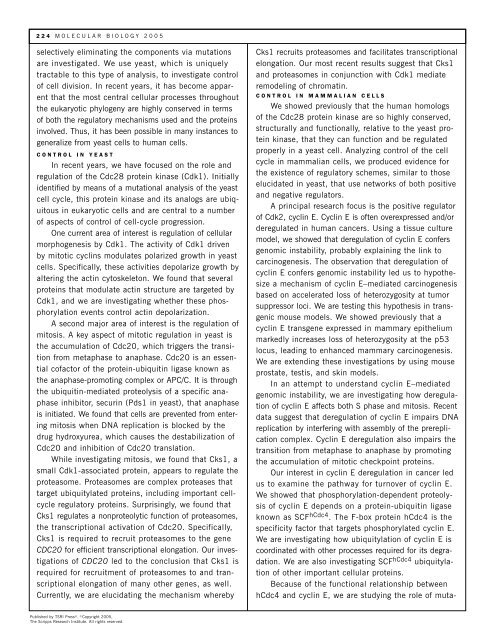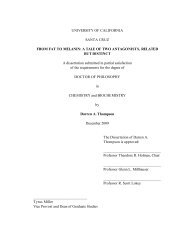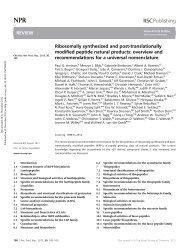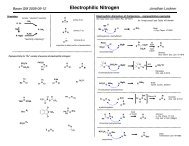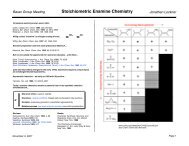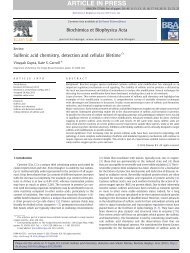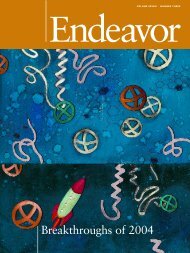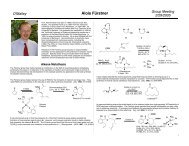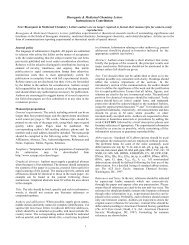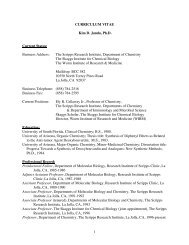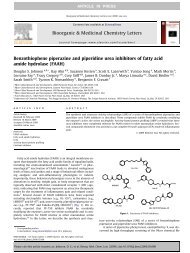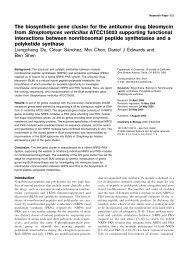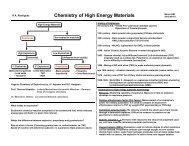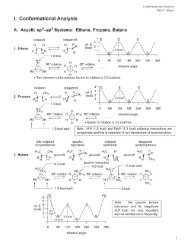Molecular Biology - The Scripps Research Institute
Molecular Biology - The Scripps Research Institute
Molecular Biology - The Scripps Research Institute
Create successful ePaper yourself
Turn your PDF publications into a flip-book with our unique Google optimized e-Paper software.
224 MOLECULAR BIOLOGY 2005<br />
selectively eliminating the components via mutations<br />
are investigated. We use yeast, which is uniquely<br />
tractable to this type of analysis, to investigate control<br />
of cell division. In recent years, it has become apparent<br />
that the most central cellular processes throughout<br />
the eukaryotic phylogeny are highly conserved in terms<br />
of both the regulatory mechanisms used and the proteins<br />
involved. Thus, it has been possible in many instances to<br />
generalize from yeast cells to human cells.<br />
CONTROL IN YEAST<br />
In recent years, we have focused on the role and<br />
regulation of the Cdc28 protein kinase (Cdk1). Initially<br />
identified by means of a mutational analysis of the yeast<br />
cell cycle, this protein kinase and its analogs are ubiquitous<br />
in eukaryotic cells and are central to a number<br />
of aspects of control of cell-cycle progression.<br />
One current area of interest is regulation of cellular<br />
morphogenesis by Cdk1. <strong>The</strong> activity of Cdk1 driven<br />
by mitotic cyclins modulates polarized growth in yeast<br />
cells. Specifically, these activities depolarize growth by<br />
altering the actin cytoskeleton. We found that several<br />
proteins that modulate actin structure are targeted by<br />
Cdk1, and we are investigating whether these phosphorylation<br />
events control actin depolarization.<br />
A second major area of interest is the regulation of<br />
mitosis. A key aspect of mitotic regulation in yeast is<br />
the accumulation of Cdc20, which triggers the transition<br />
from metaphase to anaphase. Cdc20 is an essential<br />
cofactor of the protein-ubiquitin ligase known as<br />
the anaphase-promoting complex or APC/C. It is through<br />
the ubiquitin-mediated proteolysis of a specific anaphase<br />
inhibitor, securin (Pds1 in yeast), that anaphase<br />
is initiated. We found that cells are prevented from entering<br />
mitosis when DNA replication is blocked by the<br />
drug hydroxyurea, which causes the destabilization of<br />
Cdc20 and inhibition of Cdc20 translation.<br />
While investigating mitosis, we found that Cks1, a<br />
small Cdk1-associated protein, appears to regulate the<br />
proteasome. Proteasomes are complex proteases that<br />
target ubiquitylated proteins, including important cellcycle<br />
regulatory proteins. Surprisingly, we found that<br />
Cks1 regulates a nonproteolytic function of proteasomes,<br />
the transcriptional activation of Cdc20. Specifically,<br />
Cks1 is required to recruit proteasomes to the gene<br />
CDC20 for efficient transcriptional elongation. Our investigations<br />
of CDC20 led to the conclusion that Cks1 is<br />
required for recruitment of proteasomes to and transcriptional<br />
elongation of many other genes, as well.<br />
Currently, we are elucidating the mechanism whereby<br />
Published by TSRI Press ®. ©Copyright 2005,<br />
<strong>The</strong> <strong>Scripps</strong> <strong>Research</strong> <strong>Institute</strong>. All rights reserved.<br />
Cks1 recruits proteasomes and facilitates transcriptional<br />
elongation. Our most recent results suggest that Cks1<br />
and proteasomes in conjunction with Cdk1 mediate<br />
remodeling of chromatin.<br />
CONTROL IN MAMMALIAN CELLS<br />
We showed previously that the human homologs<br />
of the Cdc28 protein kinase are so highly conserved,<br />
structurally and functionally, relative to the yeast protein<br />
kinase, that they can function and be regulated<br />
properly in a yeast cell. Analyzing control of the cell<br />
cycle in mammalian cells, we produced evidence for<br />
the existence of regulatory schemes, similar to those<br />
elucidated in yeast, that use networks of both positive<br />
and negative regulators.<br />
A principal research focus is the positive regulator<br />
of Cdk2, cyclin E. Cyclin E is often overexpressed and/or<br />
deregulated in human cancers. Using a tissue culture<br />
model, we showed that deregulation of cyclin E confers<br />
genomic instability, probably explaining the link to<br />
carcinogenesis. <strong>The</strong> observation that deregulation of<br />
cyclin E confers genomic instability led us to hypothesize<br />
a mechanism of cyclin E–mediated carcinogenesis<br />
based on accelerated loss of heterozygosity at tumor<br />
suppressor loci. We are testing this hypothesis in transgenic<br />
mouse models. We showed previously that a<br />
cyclin E transgene expressed in mammary epithelium<br />
markedly increases loss of heterozygosity at the p53<br />
locus, leading to enhanced mammary carcinogenesis.<br />
We are extending these investigations by using mouse<br />
prostate, testis, and skin models.<br />
In an attempt to understand cyclin E–mediated<br />
genomic instability, we are investigating how deregulation<br />
of cyclin E affects both S phase and mitosis. Recent<br />
data suggest that deregulation of cyclin E impairs DNA<br />
replication by interfering with assembly of the prereplication<br />
complex. Cyclin E deregulation also impairs the<br />
transition from metaphase to anaphase by promoting<br />
the accumulation of mitotic checkpoint proteins.<br />
Our interest in cyclin E deregulation in cancer led<br />
us to examine the pathway for turnover of cyclin E.<br />
We showed that phosphorylation-dependent proteolysis<br />
of cyclin E depends on a protein-ubiquitin ligase<br />
known as SCF hCdc4 . <strong>The</strong> F-box protein hCdc4 is the<br />
specificity factor that targets phosphorylated cyclin E.<br />
We are investigating how ubiquitylation of cyclin E is<br />
coordinated with other processes required for its degradation.<br />
We are also investigating SCF hCdc4 ubiquitylation<br />
of other important cellular proteins.<br />
Because of the functional relationship between<br />
hCdc4 and cyclin E, we are studying the role of muta-


